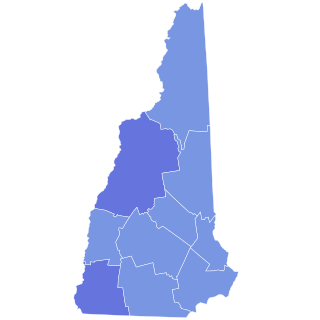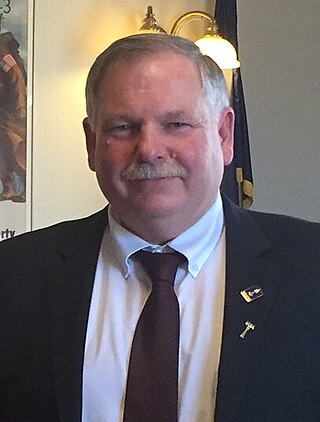Related Research Articles

John Hayden Lynch is an American attorney, businessman, and politician who served as the 80th governor of New Hampshire from 2005 to 2013. Lynch was first elected governor in 2004, defeating first-term Republican incumbent Craig Benson – the first time a first-term incumbent New Hampshire governor was defeated for re-election in 80 years. Lynch won re-election in landslide victories in 2006 and 2008, and comfortably won a fourth term in 2010.

New Hampshire is a state in the New England region of the Northeastern United States. It borders Massachusetts to the south, Vermont to the west, Maine and the Gulf of Maine to the east, and the Canadian province of Quebec to the north. Of the 50 U.S. states, New Hampshire is the eighth-smallest by land area and the tenth-least populous, with a population of 1,377,529 residents as of the 2020 census. Concord is the state capital and Manchester is the most populous city. New Hampshire's motto, "Live Free or Die", reflects its role in the American Revolutionary War; its nickname, "The Granite State", refers to its extensive granite formations and quarries. It is well known nationwide for holding the first primary in the U.S. presidential election cycle, and for its resulting influence on American electoral politics.

Hillsborough County is the most populous county in the U.S. state of New Hampshire. As of the 2020 census, the population was 422,937, almost one-third the population of the entire state. Its county seats are Manchester and Nashua, the state's two biggest cities. Hillsborough is northern New England's most populous county as well as its most densely populated.

Nashua is a city in southern New Hampshire, United States. As of the 2020 census, it had a population of 91,322, the second-largest in northern New England after nearby Manchester. It is one of two county seats of New Hampshire's most populous county, Hillsborough; the other being Manchester.

Salem is a town in Rockingham County, New Hampshire, United States. The population was 30,089 at the 2020 census and an estimated 30,647 in 2022. Salem is a northern suburb of Boston located on Interstate 93. As the first town along I-93 northbound in New Hampshire, which lacks any state sales tax, Salem has grown into a regional commercial hub for the northern section of Greater Boston, anchored by the Mall at Rockingham Park and Tuscan Village. Other major sites include Canobie Lake Park, a large amusement park; and America's Stonehenge, a stone structure of disputed origins. It is the former home of Rockingham Park, a horse racetrack. The Sununu political family hails from Salem, including former New Hampshire governor and White House Chief of Staff John H. Sununu, and his sons John E. Sununu, a former U.S. senator, and Chris Sununu, current New Hampshire governor.
The State of New Hampshire has a republican form of government modeled after the Government of the United States, with three branches: the executive, consisting of the Governor of New Hampshire, the elected Executive Council, and subordinate agencies; the legislative, called the New Hampshire General Court, which includes the Senate and the House of Representatives; and the judicial, consisting of the Supreme Court of New Hampshire and lower courts.
A public utilities commission is a quasi-governmental body that provides oversight and/or regulation of public utilities in a particular area, especially in the United States and Canada.

The New Hampshire Department of Transportation (NHDOT) is a government agency of the U.S. state of New Hampshire. The Commissioner of NHDOT is Victoria Sheehan. The main office of the NHDOT is located in the J. O. Morton Building in Concord.
The New Hampshire Department of Safety is a government agency of the U.S. state of New Hampshire. The Department of Safety is under the executive direction of Commissioner of Safety Robert L. Quinn. The main office of the Department of Safety is located at the James H. Hayes Safety Building in Concord.

Interstate 95 (I-95) is an Interstate Highway on the east coast of the United States, connecting Florida to Maine. Within the state of New Hampshire, it serves the Seacoast Region and is a toll road named the Blue Star Turnpike or New Hampshire Turnpike. The 16-mile (26 km) turnpike is maintained by the New Hampshire Department of Transportation (NHDOT) Bureau of Turnpikes and has a single toll plaza near Hampton.
The New Hampshire Liquor Commission (NHLC) is a government agency of the U.S. state of New Hampshire. The commission regulates the sale of alcoholic beverages in New Hampshire, one of 17 alcoholic beverage control states.

The Libertarian Party of New Hampshire (LPNH) is the New Hampshire affiliate of the national Libertarian Party (LP). Active since its foundation in 1972, it is the third-largest political party in the state having had multiple members elected to the New Hampshire House of Representatives as well as being ballot-qualified multiple times.

The New Hampshire Police Standards and Training Council (PSTC) is a government agency of the U.S. state of New Hampshire. The council is responsible for establishing minimum hiring and educational standards as well as the certification process for police and state corrections officers. The council also provides mandatory basic training and in-service training to all police and state corrections officers within New Hampshire.
The New Hampshire Department of Education is the state education agency of the U.S. state of New Hampshire. It is headquartered in Concord. Frank Edelblut has led the department as commissioner since February 16, 2017.

The 2012 New Hampshire gubernatorial election took place on November 6, 2012, concurrently with the 2012 U.S. presidential election, U.S. House elections, and various state and local elections.

The 2014 New Hampshire gubernatorial election was held on November 4, 2014, to elect the governor of New Hampshire, concurrently with the election to New Hampshire's Class II U.S. Senate seat, as well as other elections to the United States Senate in other states and elections to the United States House of Representatives and various state and local elections.

Shawn N. Jasper is an American politician from the state of New Hampshire. A member of the Republican Party, he serves as the Commissioner of the New Hampshire Department of Agriculture, Markets, and Food, and is a former Speaker of the New Hampshire House of Representatives.

The 2018 New Hampshire gubernatorial election took place on November 6, 2018, to elect the governor of New Hampshire. Incumbent Republican governor Chris Sununu won re-election to a second term, defeating former state senator Molly Kelly. Sununu was the first incumbent Republican to win reelection as governor since Steve Merrill was reelected in 1994.

The COVID-19 pandemic in New Hampshire is part of an ongoing pandemic of coronavirus disease 2019 (COVID-19) in the U.S. state of New Hampshire. The first confirmed case was reported on March 2, 2020. A state of emergency was declared March 13, which included a ban on gatherings of 50 or more people. A small group filed a lawsuit claiming the order infringed on their right to assemble and worship; a judge dismissed the suit. On March 26, all nonessential businesses were closed and Governor Chris Sununu advised people to only leave home for essential necessities. That stay-at-home order was extended several times before being allowed to expire on June 15. Through November 22, a total of 74 emergency orders had been issued by Sununu. Sununu lifted the mask mandate as of April 16, 2021.
References
- 1 2 "Change Name to Public Utilities Commissions". Nashua Telegraph . Nashua, New Hampshire. AP. August 7, 1951. p. 1. Retrieved February 18, 2022– via newspapers.com.
- 1 2 "Commissioners & Staff". NH.gov. Retrieved February 18, 2022.
- 1 2 3 "New Hampshire Public Utilities Commission: About Us". NH.gov. Retrieved February 18, 2022.